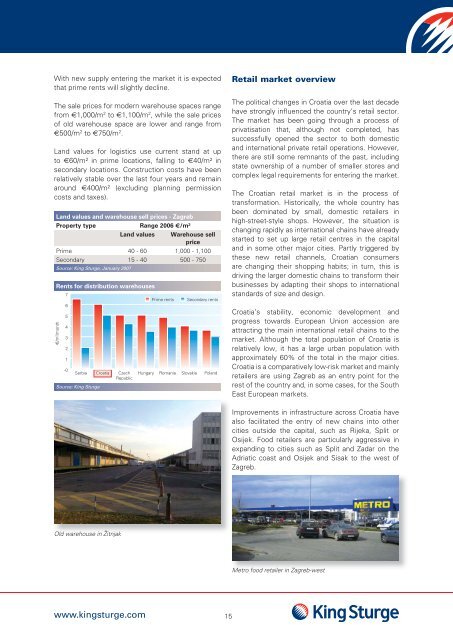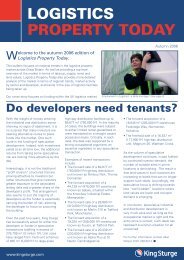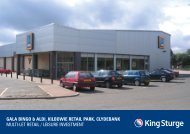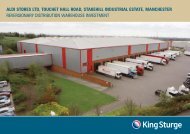You also want an ePaper? Increase the reach of your titles
YUMPU automatically turns print PDFs into web optimized ePapers that Google loves.
With new supply entering the market it is expected<br />
that prime rents will slightly decline.<br />
The sale prices for modern warehouse spaces range<br />
from €1,000/m 2 to €1,100/m 2 , while the sale prices<br />
of old warehouse space are lower and range from<br />
€500/m 2 to €750/m 2 .<br />
Land values for logistics use current stand at up<br />
to €60/m² in prime locations, falling to €40/m² in<br />
secondary locations. Construction costs have been<br />
relatively stable over the last four years and remain<br />
around €400/m² (excluding planning permission<br />
costs and taxes).<br />
Land values and warehouse sell prices - Zagreb<br />
Property type Range <strong>20</strong>06 €/m²<br />
Land values Warehouse sell<br />
price<br />
Prime 40 - 60 1,000 - 1,100<br />
Secondary 15 - 40 500 - 750<br />
Source: <strong>King</strong> <strong>Sturge</strong>, January <strong>20</strong>07<br />
Rents for distribution warehouses<br />
€/m 2 /month<br />
7<br />
6<br />
5<br />
4<br />
3<br />
2<br />
1<br />
-0<br />
Serbia<br />
Source: <strong>King</strong> <strong>Sturge</strong><br />
Croatia<br />
Old warehouse in Žitnjak<br />
Czech<br />
Republic<br />
Hungary<br />
Prime rents Secondary rents<br />
Romania<br />
Slovakia<br />
Poland<br />
www.kingsturge.com 15<br />
Retail market overview<br />
The political changes in Croatia over the last decade<br />
have strongly infl uenced the country’s retail sector.<br />
The market has been going through a process of<br />
privatisation that, although not completed, has<br />
successfully opened the sector to both domestic<br />
and international private retail operations. However,<br />
there are still some remnants of the past, including<br />
state ownership of a number of smaller stores and<br />
complex legal requirements for entering the market.<br />
The Croatian retail market is in the process of<br />
transformation. Historically, the whole country has<br />
been dominated by small, domestic retailers in<br />
high-street-style shops. However, the situation is<br />
changing rapidly as international chains have already<br />
started to set up large retail centres in the capital<br />
and in some other major cities. Partly triggered by<br />
these new retail channels, Croatian consumers<br />
are changing their shopping habits; in turn, this is<br />
driving the larger domestic chains to transform their<br />
businesses by adapting their shops to international<br />
standards of size and design.<br />
Croatia’s stability, economic development and<br />
progress towards European Union accession are<br />
attracting the main international retail chains to the<br />
market. Although the total population of Croatia is<br />
relatively low, it has a large urban population with<br />
approximately 60% of the total in the major cities.<br />
Croatia is a comparatively low-risk market and mainly<br />
retailers are using Zagreb as an entry point for the<br />
rest of the country and, in some cases, for the South<br />
East European markets.<br />
Improvements in infrastructure across Croatia have<br />
also facilitated the entry of new chains into other<br />
cities outside the capital, such as Rijeka, Split or<br />
Osijek. Food retailers are particularly aggressive in<br />
expanding to cities such as Split and Zadar on the<br />
Adriatic coast and Osijek and Sisak to the west of<br />
Zagreb.<br />
Metro food retailer in Zagreb-west








